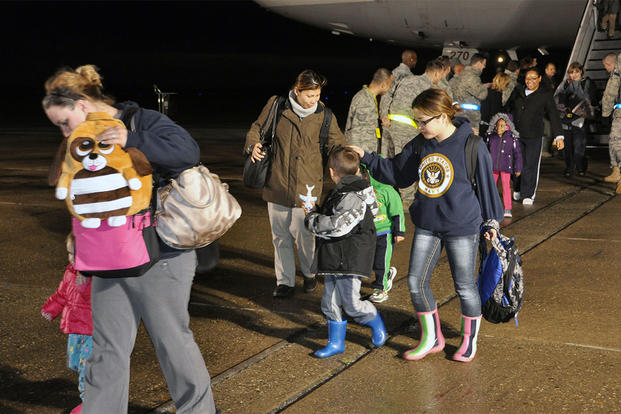Maybe you know it as a Family Readiness Group (FRG). Or maybe you call yours a Family Readiness Program, Key Spouse program, Ombudsman Program, or Work-Life Program.
No matter what you call your FRG, one thing is universal: If you want to join, make sure your spouse has your most accurate, up-to-date contact information and knows you want to be involved.
Hesitant? Don't be. See here for why you should get on the roster today, even if you aren't ready to join in.
Just like the groups' names, the processes for joining vary across branches:
Army
Every brigade in the Army has a Family Readiness Support Adviser (FRSA) whose job it is to support both the command and the Family Readiness Group. (In the Special Forces Groups, each battalion has a FRSA.)
An FRSA will oversee a number of FRGs, all of which are staffed by volunteer family members like yourself. When your spouse joins a new unit, the battalion S1 and the unit's first sergeant will be notified immediately. Your unit's FRG hospitality/welcome committee chairperson is regularly in touch with them to stay apprised of new arrivals and should extend a warm welcome to you and your family.
If your spouse arrives at a unit and you never hear from the FRG, don't take it personally! Your welcome committee chairperson may have not received your correct contact information, or maybe he or she is overwhelmed and slow to say "hello." Or maybe your unit is low on volunteers and the FRG leader is filling that role as well as her own. Don't take the silence personally.
Instead, take the time to make sure you are on the roster. Your spouse can talk to the squad leader and command to make sure the FRG has your correct contact information, and you can reach out to your FRSA to get the contact information for the volunteer workers in your FRG.
Reach out to them, and make sure they know who you are. While it's their goal to contact you first, don't be afraid to do it yourself. They will be excited to hear from you.
Air Force
In the Air Force, the FRG is called the Key Spouse Program. While every Air Force spouse can turn to the Airman & Family Readiness Center for support, many squadrons also have a Key Spouse Program that exists at the commander's behest. Some are very robust and active, others are only really engaged during a deployment.
If a deployment is on the horizon, your spouse will fill out paperwork during out-processing in which they will be asked for your contact information and whether it's OK to share it with the squadron.
This is important: If you want to be on the calling roster or be involved with the Key Spouse Program, your information has to be shared.
Because your spouse will make the call (while quickly filling out paperwork) about whether you should be contacted, many spouses find they are in the dark when it comes to the Key Spouse program. If that happens to you, make sure you tell your spouse you want to be on the roster. Also, take the time to go to the Airman & Family Readiness Center and tell them you want to be on the distribution list. They will be able to put you in touch with your key spouse.
To be clear, not every squadron in the Air Force has a Key Spouse program. For those of you whose squadrons do not, the Airman & Family Readiness Center will be your main support -- unless you want to get approval for a Key Spouse program of your own. Have your spouse reach out to the commander and first sergeant, but be ready to roll up your sleeves!
Marine Corps
In typical Marine Corps fashion, you can count on the Corps to rely on you to do some of the heavy lifting when it comes to joining the FRG. In fact, you could probably go 20 years in the Corps without ever once hearing about an FRG.
But they do exist, and they do so under the auspices of an FRO. The FRO -- Family Readiness Officer -- is a full-time civilian tasked with keeping up-to-date with all the important information for your spouse's unit, organizing family readiness briefings, and supporting you.
Your FRO can also be your point person for all your benefits both on base and in the Corps. For larger commands (like Headquarters Company or a big infantry battalion), the FRO will often also organize family fun events.
When your spouse checks into a new unit, part of the check-in process will be to meet with the FRO. This is your standard check-mark visit, so he or she needs to have your information ready to go so that the FRO can get you on the roster. Just to be smart, follow up with your new FRO within a few days. Most FROs do a significant amount of their communication electronically, so if your information was never entered (or entered incorrectly), you'll never know.
If your spouse is with a smaller unit (particularly units like Police Advisory Teams), you might be grouped with an FRO who isn't at your base.
For example, say your spouse deploys from Quantico to a PAT team in the far reaches of the world, and the unit providing security to that outpost is from Twentynine Palms. While you are used to being able to knock on the door of your FRO's office in Quantico or attend FRG family fun nights with the kids, you might find that for the course of deployment, your FRO will be the one attached to the Twentynine Palms security team.
This can make things tricky and complicated during deployment, so the onus is on you to really stay on top of who the FRO is and how to be in touch. If your spouse can't be in touch and you aren't sure who your FRO is, reach out to your last FRO for help. He or she can help you track down the information you need.
Navy
If you are a Navy spouse, your point-person is your ombudsman, a civilian (often a spouse) whose job it is to ensure command readiness through family readiness. The ombudsman doesn't run the FRG -- and it's important to note that the ombudsman is not involved with the FRG in any official capacity -- but if you are new to a unit and trying to get involved with the FRG, your ombudsman is the place to start.
While your ombudsman is the official person who will disseminate information from command, he or she will also encourage you to join the FRG for support, camaraderie, and information regarding deployment, homecoming and reintegration. The FRG is also responsible for coordinating social events for ships' families.
If you don't receive information about the ship's Family Readiness Group when your sailor checks in, reach out to the ombudsman yourself.
"I'm part of an FRG staff," said Ashley, a Navy wife. "We cannot contact anyone unless we are given permission." She warns against relying on your ombudsman or FRG to contact you and instead encourages you to find your Family Readiness Group both in person and online.
"Most FRGs are starting to create their own Facebook page, but if they don't have one, the ombudsman can definitely help you find out if your command has one. Ours is very open and all events are open to those with a deployed member. Since the FRC [Family Readiness Center] on our base does not have one, we sometimes have their members join us for meetings and events."
Many of our Navy readers report that their FRGs have shut down when a ship comes home, but some may remain open and active, especially if there is interest from the spouses. "It's really hard for families to meet other spouses except through their military member," Ashley said. "So we have decided to have meetings all year around to try to help as new families come in."
Reserves/Guard
Yes! You have a FRG, too! This is welcome news for most Reserve and Guard spouses, for whom regular connectivity to a military community might be slim to none.
When everyone around you is going about their civilian lives as usual, the support you need to navigate the details of military life -- from how to handle a deployment to the resources available to you as a military spouse -- is all the more important.
Your spouse will be responsible for getting you linked up with your Family Readiness Group, which may be geographically determined or based on his military specialty. Make sure your spouse knows it's important to you to be a part of the Family Readiness Group. Even if you think you have all the support you need in your civilian life, there will come a day you have a very important question and don't know who to turn to for an answer, and that's where your FRG comes in. Be ready. Be on the roster.
Coast Guard
Whereas for some branches, the FRG is the voice of official word for families during deployments, the Coast Guard operates a little differently.
The Coast Guard operates its family support services through the Work-Life Program, which exists to support the service members, civilian employees and families affiliated with your district. Your Work-Life office relies heavily on volunteer ombudsmen to operate as your station's point of contact and disseminate important support information to families at each station.
When you arrive at a new station, you may be greeted by your ombudsman at a welcome aboard fair or learn about them in a newsletter. Some commands require that spousal information be shared as part of the check-in process and then distribute that information to the ombudsman, ensuring that you will be on the ombudsman's roster as long as they have your correct contact information.
But because there is no official process for how to get, maintain and share spousal information with your local ombudsman, there is no guarantee that yours knows who you are and that you would like to be in the know.
Take it upon yourself to contact your district's work-life office as soon as you arrive at a station so that you can get the contact information for your point of contact and be directly in touch with him or her. After all, the best way to ensure you are on all the rosters for any important information is to put your name there yourself.
Despite the differences in family readiness support across the branches, one thing is for certain: the Family Readiness Groups is important, and there's no risk in joining. You may use it just for information updates and to stay in the loop, or it may prove to be a whole support system with friends and activities you can't imagine life without.
Whatever your role, go ahead and join. The Family Readiness Group is only as strong as its members make it.











